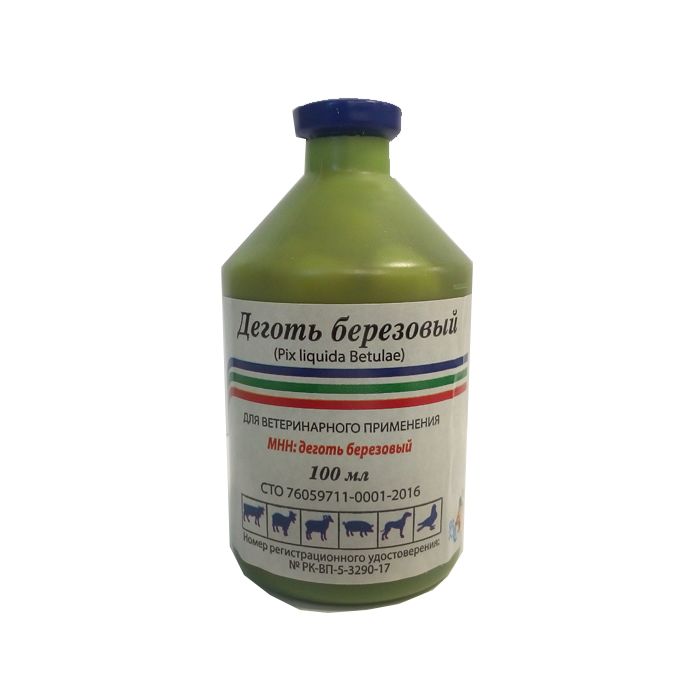Birch tar 100ml
DESCRIPTION
Birch tar - for a protective coating (resin) of wood and processing of leather products. In appearance, birch tar is a thick, oily, non-sticky liquid of black color, with a bluish-greenish or greenish-blue tint in reflected light, with a specific unsharp tar smell and a pungent taste. Mixes up with ether and chloroform, dissolves in solutions of caustic alkalis and in absolute alcohol. It dissolves poorly in water (floats in it). From shaking the tar with 10 parts of water, tar water is obtained, with a tar smell, of an acidic reaction.
COMPOSITION
A preparation obtained by dry distillation of the outer part of birch bark (selected birch bark). Contains benzene, xylene, cresol, cresote, toluene, guaiacol, phenol, resins and other substances
PHARMACOLOGICAL PROPERTIES
Birch tar has strong antiseptic, locally irritating, keratoplastic (3 - 5%), keratolytic (30 - 50%), anti-inflammatory, insecticidal, antiparasitic and disinfectant properties, improves blood circulation to tissues, moderately irritates sensitive nerve endings, stimulates the regeneration of the epidermis of damaged tissues keratinization process, dries wounds and accelerates their healing. After short-term exposure, it kills many bacteria and, in particular, tubercle bacillus and anthrax spores. In weak concentrations it activates the growth of granulation, in strong (above 10%) it sharply weakens.
INDICATIONS
Skin diseases - eczema, dermatomycosis (trichophytosis, microsporia), scabies, furunculosis, pyoderma, bedsores, burns, ulcers, frostbite, wound infections, wounds in the extremities, cracked horses' hooves, horn shoe in cattle, hoof lesions in foot and mouth disease and other Flatulence of the stomach and intestines, tympanic scar. Infectious and parasitic diseases of the respiratory tract. For disinfection of livestock, production facilities, equipment and inventory.
DOSAGE AND APPLICATION
Birch tar is used mainly externally in the form of 10-30% ointment or liniment for the treatment of skin diseases. It is an integral part of soap-tar alcohol (tar, green soap and ethyl alcohol 95%, 1 equal part); tar ointment (1 part of tar and paraffin ointment (1 part of paraffin and 3 - 4 parts of vaseline oil - an indifferent ointment base) 10 parts); Viennese tar liniment (1 part of tar and sulfur, 2 parts of alcohol and green soap); Wilkinson's ointment (15 parts of tar, 10 parts of calcium carbonate (precipitated chalk), 15 parts of purified sulfur, 30 parts of naftalan ointment, 30 parts of green soap, 4 parts of water); balsamic liniment according to Vishnevsky (tar 3 parts, xeroform 3 parts, castor oil 94 parts).
Apply to the affected skin 2 times a day. The course of treatment is 5 - 12 days, with fungal diseases - up to 3 weeks. All tar preparations for the treatment of scabies are applied warm (40 - 50 C В°) and carefully rubbed into the skin. The course of treatment is twice with an interval of 7 days.
In advanced cases - three times with an interval of 3-4 days. For foot-and-mouth lesions, the hooves are cleaned and treated with pure birch tar or a mixture of tar in half with fish oil to lubricate and soak the dressings. Inside, tar is rarely prescribed as an anti-fermentation and disinfectant for the stomach and intestines (in the form of a 10% aqueous emulsion) for horses and cattle 10.0 - 25.0 g; small ruminants and pigs 2.0 - 5.0 g; dogs 0.1 - 1.0 g; chickens 0.05 - 0.2 g per head. It is used for infectious and helminthic diseases of the respiratory tract as an expectorant, antimicrobial and antiparasitic agent in the form of inhalation of pure tar vapors. Tar in various 5-10% sulfur-tar (alkaline) solutions is used for disinfection of premises, stockyards, cesspools, animal care items and stalls.
SPECIAL INSTRUCTIONS
After external use, there are no waiting times for meat and milk before slaughter. Cats have an increased sensitivity to birch tar, so it must be prescribed with extreme caution. In case of poisoning with tar, it is necessary to rinse the stomach, then inject burnt magnesia or Glauber's salt in an aqueous solution.
CONTRAINDICATIONS
The use of tar-based products is contraindicated in eczema in the acute stage, in case of impaired renal function. You can not ask productive animals inside before slaughter. Do not use for disinfection of premises intended for storage and processing of meat and milk.
SIDE EFFECTS
With prolonged use of tar, skin irritation is possible. When tar is applied internally or externally in significant quantities, poisoning may occur, manifested mainly by inflammation of the kidneys and the phenomena of paralysis of the central nervous system. At the same time, urine, as in case of poisoning with phenol and other similar substances, turns dark.
SHELF LIFE AND STORAGE
Store in a well-sealed container in a cool, dry, dark place. The shelf life is 5 years.
PACKAGING
Packaged in glass bottles of 100 ml.
Specifications
KolVUP
50
Manufacturer
Vetspectrum
Teaser
for the protective coating (resin) of wood and leather processing

